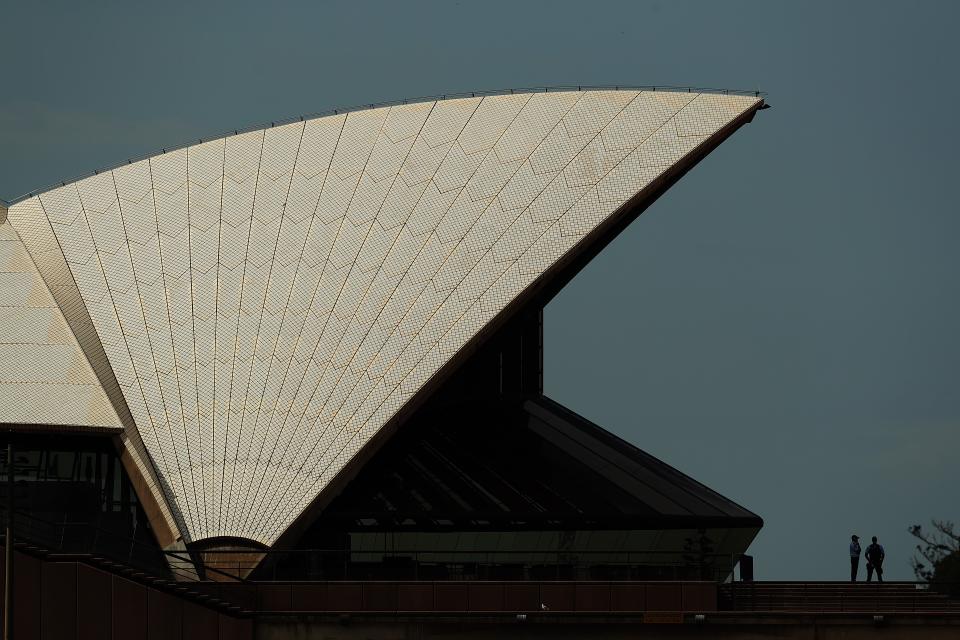What does the extreme COVID lockdown in Australia really look like? My family is living it.
- Oops!Something went wrong.Please try again later.
Americans might be forgiven for looking down under to Australia and wondering what’s going on.
Some of the headlines sound downright despotic: The Australian military deployed to the streets of Sydney to enforce the latest COVID lockdown. In the United States, this might recall times when the National Guard were called in to quell riots or enforce desegregation in the U.S. All for a lockdown?
Not quite. For Australia, it’s more like sending out a swarm of parking inspectors. Australians tend to be more risk averse and rule tolerant than our American friends. Our low-violence police are generally not a source of fear in the community.
But there are extraordinary aspects to Australia’s COVID policies: Australians abandoned overseas, banned from leaving the country, and rolling lockdowns enforced increasingly stringently on a restless population.
My own family’s experience, whilst minor compared to others’, might serve to illustrate some of the challenges Australian families have faced and some of the absurdities of the stressed, bureaucratic machine deployed to protect Australia.
My family’s brush with bureaucracy
My wife is Mexican. Earlier this year, she flew with our three children, all under 5, to Mexico for 3 months to attend to a family health issue. We were fortunate for them to be able to leave in the first place and then to make it back at all – last month the Australian government cut intakes to an already restrictive border regime ahead of their departure from Mexico.
On their return to Australia and 14 days mandated quarantine, our 4 year old was taken alone in a separate ambulance because he had a cough. Their luggage was misplaced during transit, leaving them without luggage for 2 days – a long time with 3 young kids. During quarantine, they were checked in on multiple times a day (often late at night when asleep). Certain kitchen utensils were forbidden and the oven disabled. Was she presumed psychotic or at risk of COVID? The lines between caution, theater and incompetence ran thin.
On the last few days, the nurses caught my wife with a cough. They tested her several times: negative. On Aug. 2, the day of her expected discharge, bags packed and kids ready to go, they were not discharged. They had to wait for another test result. Same day test results are available elsewhere, but not at the quarantine facilities, apparently.
USA TODAY's Louie Villalobos and Jason Lalljee: We are failing at COVID at exactly the wrong time. Time for some truth.
We were angry at this point. On what basis could they continue to hold her following several negative tests? What information did they have that we didn’t? Could they ask for new tests indefinitely? We were provided with no information. More days or another 14 day stint was the worst case scenario we feared.
Her test results came back negative (again). But the paperwork for discharge was delayed: apparently emails were down where it mattered. Bureaucracy turned farce.
I called ministers, health officials, and arrived at the facilities to demand discharge. Front line staff whether security officials, nurses, facility operations managers, minister office staffers, were universally lovely and sympathetic. But it was impossible for me to reach a decision maker. I ran into the contours of the machine: cautious and lumbering, immune to pleas, to reason, to appeal. All process, no responsibility.
Of course, it wouldn’t work for the health minister to answer every concerned father’s call. We suffered only 14 hours of additional detention out of a mix of excessive caution and bureaucratic morass; she was released Aug. 3. But it was enough to glimpse the infuriating, impersonal interactions of those who really fall under the grinding gears of state bureaucracy.
How did we get here?
Australians abandoned overseas
Thousands of Australians have been stranded overseas as their own government closed its borders on them at the start of the pandemic. Flights are unavailable or exorbitantly priced, or in some cases citizens (e.g. in India) have been outright banned from returning. Instead of sending our military or chartering commercial airlines to bring home our people like some smaller, less prosperous nations have done, we abandoned them.
Exit banned
Australians have been banned from leaving the country – a unique step in the world. To someone born in the Soviet Union like me, this is shocking. To leave, you must apply for an exemption and describe your emergency. In a nation where almost a third of the residents are born overseas, this has had real consequences for Australian families. Elderly parents left to die alone. Newborns separated from their parents. Dedicated Facebook groups record endless such stories, pleading for help. Remarkably, the government is only tightening the screws.

There is something deranged about a polity that abandons its overseas citizens then prohibits the rest from leaving on the basis that it might be responsible for their return – when it has already shirked that responsibility.
Australia’s initial COVID success
Australia successfully kept out COVID when it began to devastate global communities in 2020. Australia’s an island and has a population smaller than Texas’ that mainly lives in a few cities. Australia has suffered fewer than 1,000 deaths to date, compared to over 600,000 deaths in the U.S. This means that, rather morbidly, people in the U.S. and elsewhere have gotten used to COVID deaths, and reductions to manageable levels are considered a success. In Australia, where the bar is still close to zero, any increases are politically and morally fraught.
That’s important to keep in mind as Australia continues to chase a policy of COVID elimination.
Failed leadership and blunt tools
Initial success made Australia’s leaders arrogant.
No quarantine facilities were built, there was no rush to vaccinate. Leaders played up fears around AstraZenica, fostering community hesitancy, then lost credibility as they flip-flopped. Australia has been back of the pack on population vaccination. It’s inexcusable that 18 months since the pandemic began, we still have insufficient quarantine capacity. These failures have meant that our federal and state governments must rely on harsh closed border and lockdown policies.

Lockdowns are almost ridiculous by nature: arbitrary rules around acceptable travel distances, what kinds of businesses must close, shifting social distancing rules. Lockdown enforcement looks even worse. Handcuffing an elderly man for not wearing a mask outside. Police door knocking to check on residents. An impersonal bureaucracy administering emigration applications and quarantine facilities for its own citizens.
Australians are angry
Protests are getting larger and louder. In late July, large protests erupted in Sydney amidst a lockdown. The following weekend police came out in force and banned Uber and taxi services from taking rides into the city. Increasingly draconian measures in the context of failed leadership.
Dr. Fauci on back to school: 'Anybody who is anywhere near a child ... should be vaccinated'
Police came to my home and fined me $1,000 for cycling beyond the designated perimeter. Someone snitched. The government is encouraging this kind of Stasi pettiness. The police told me how frustrated they were: fielding constant calls from nosey neighbors about mis-worn masks and other infringements. They even offered to help with groceries. Australians are decent people, but the government is playing to our smallest selves.
COVID has revealed something ugly about the Australian polity: a callousness towards its own citizens, leadership that hides behind medical expertise, a parochial suspicion of interstaters and foreigners. But I’m also grateful that Australians haven’t seen COVID rampage through the community, and Australians are ramping up vaccinations. We’ll get through this. The absurdities of bureaucracies and pettiness of lockdown will hopefully soon be a strange dream.
Misha Saul is an Australian investor and posts occasional essays and conversations at www.mishasaul.com.
You can read diverse opinions from our Board of Contributors and other writers on the Opinion front page, on Twitter @usatodayopinion and in our daily Opinion newsletter. To respond to a column, submit a comment to letters@usatoday.com.
This article originally appeared on USA TODAY: Australia's extreme COVID lockdown: What exactly are the rules?

